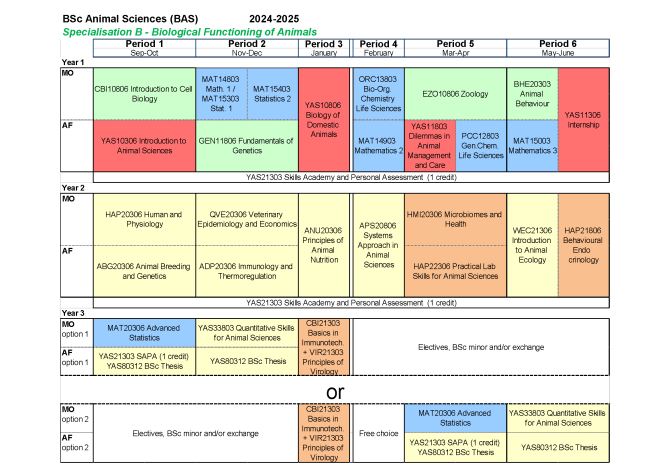Study programme - BSc Animal Sciences
The bachelor's Animal Sciences is a three-year full-time programme. In the first year you follow a basic programme which gives you an orientation in the domain of Animal Sciences. In the second year, you choose one of two specialisations: 'Animal Management and Care' or 'Biological Functioning of Animals'. In the third year a large part is free choice and you will write your BSc thesis. During these three years, you receive a broad basis and introduction to the entire domain of Animal Sciences. From this basis, you can discover where your passion lies for your future master and career.

Year 1
Year 2
In the first half of the second year, the basic knowledge of year 1 is integrated into discipline courses within animal sciences (white coloured, see the figure under tab Year 1); think of genetics, nutrition, epidemiology, housing, immunology, reproduction, ecology and sustainability. For details on course content visit the online course catalogue.
The second half of the second year you will choose one of the two specialisations: 'Animal Management and Care' or 'Biological Functioning of Animals' (orange-coloured, see the figure under tab Year 1).
The specialisation 'Animal Management and Care' concentrates on how to manage the animals we care for in terms of nutrition, housing and the impact the (human) environment has on animal behaviour, growth and well-being. The focus is from animal to its environment and society.
The specialisation 'Biological Functioning of Animals' concentrates on the biological/physiological processes within animals and how these contribute to the way animals react and interact with their environment. The focus is from gene to animal.
Year 3
For one part, the third year consists of the remaining specialisation courses and by writing a BSc thesis. However, for the most part, you decide your course programme (see figure under tab Year 1).
Free choice
Essentially, you can fill in this free choice with any given course at the university. You could deepen your knowledge in animal sciences principles, but you could also take courses in communication, education, economics or plant sciences, to name a few. As a matter of fact, it is recommended to take a ‘side step’ from animal sciences to broaden your horizon. With this elective freedom you determine yourself how broad or specialised your programme will be. The courses can be taken at Wageningen University or at another university in the Netherlands or abroad. See the online course catalogue for more information.
Minor
The elective freedom can be filled with individual courses, but you can also choose a package of courses in a theme: a BSc minor. A BSc minor covers 24 credits and are usually taught in English. Wageningen University & Research offers around 50 minors on various themes: infectious diseases, marine biology, climate change, communication, food safety, economics or water management, to name a few examples. A minor can also be taken at another university in the Netherlands or even in another country. Read more about this option under ‘Studying abroad’.
BSc thesis
In the third year, you complete your bachelor's degree with a BSc thesis. You write the BSc thesis on the basis of an individual small research project, such as assisting with an experimental doctoral research, writing a literature review, working on a laboratory analysis and/or data analysis, or working on your own project. During your BSc thesis, the following skills are also covered: scientific writing, interpreting and discussing of scientific literature, and presenting scientific research. The subject of your thesis fits one of the specialisations and within the discipline of Animal Sciences.
Studying abroad
The programme encourages you to broaden your horizon, also abroad. In the third year you can chose your elective subjects at a university outside the Netherlands. We maintain ties with various partner universities, in that various courses with animal sciences related subjects can be offered.
The purpose of an exchange is to enable students to take interesting courses that are complementary to our own programme, and to make students aware of the global issues concerning animal sciences. In addition, you obtain an international mindset and approach.
Student experience
The option to study abroad is subject to exchange agreements between partner universities and admission requirements set by these universities. To be eligible for a BSc exchange minor, students must therefore satisfy some prerequisites.
More information on exchanges in general and Wageningen’s partner universities is available from the Wageningen Exchange Office website.
Study Load and the Academic Year
The programme is a three-year bachelor in which 60 credits (ECTS) can be obtained per year. The total study load is therefore 180 ECTS. One ECTS corresponds to 28 study load hours and one academic year includes 40 teaching weeks. This means students are expected to devote an average of 42 hours per week to their studies, making the programme genuinely full-time.
The academic year in Wageningen is divided into 6 teaching period. Periods last 8 weeks (period 1, 2, 5 and 6) or 4 weeks (period 3 and 4). Each eight-week teaching periods is worth 12 ECTS, usually including two courses. Each four-week teaching period is worth 6 ECTS, usually including one course.
Teaching methods
Student Counselling
The Animal Sciences programme has an education team consisting of a programme director, three bachelor study advisers (one especially for international students), two master study advisers and a study recruiter.
For a conversation or counselling you can always contact our study advisers. They can help you plan your study, with choosing specialisations and subjects, study problems or private matters that affect your study.


